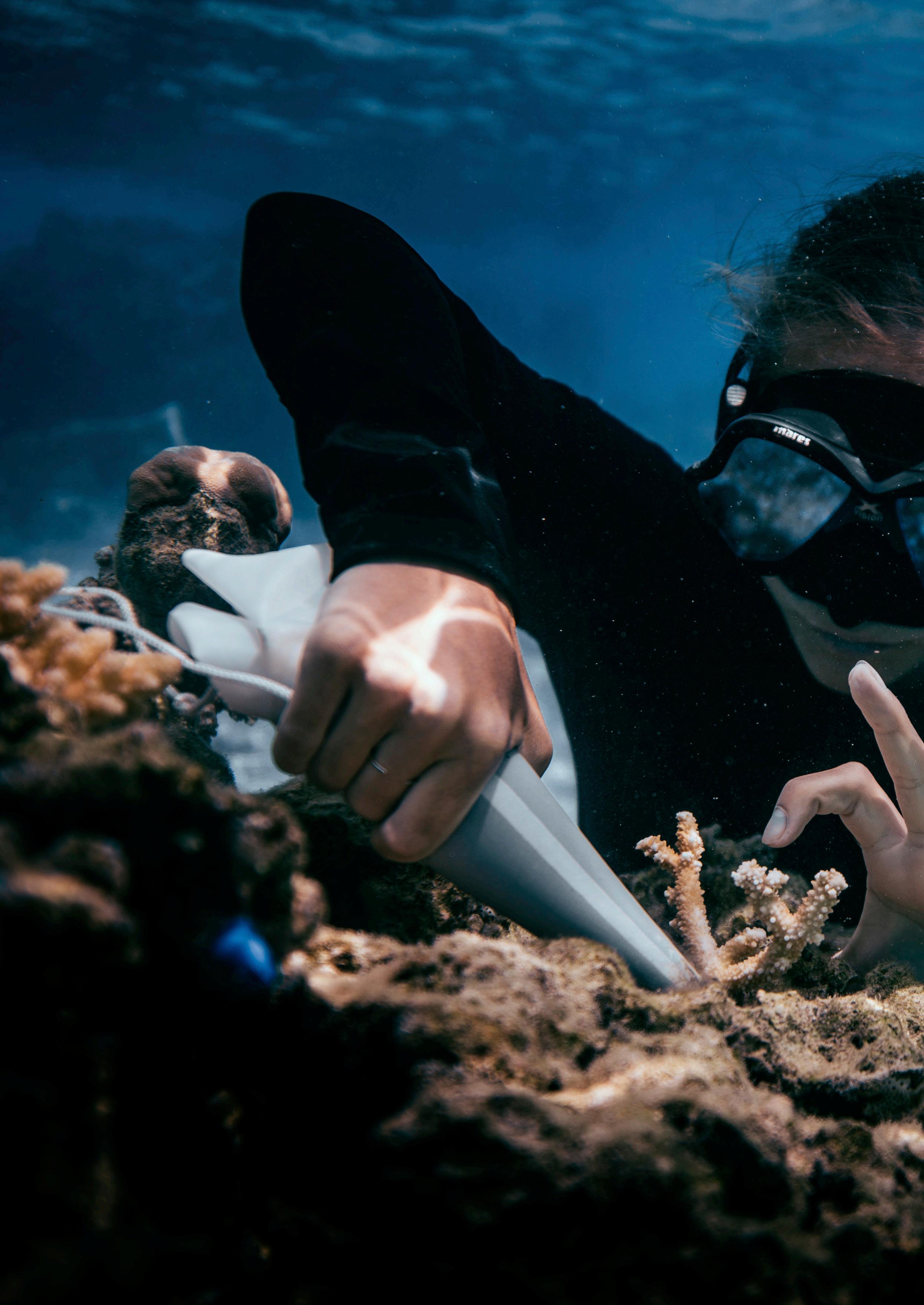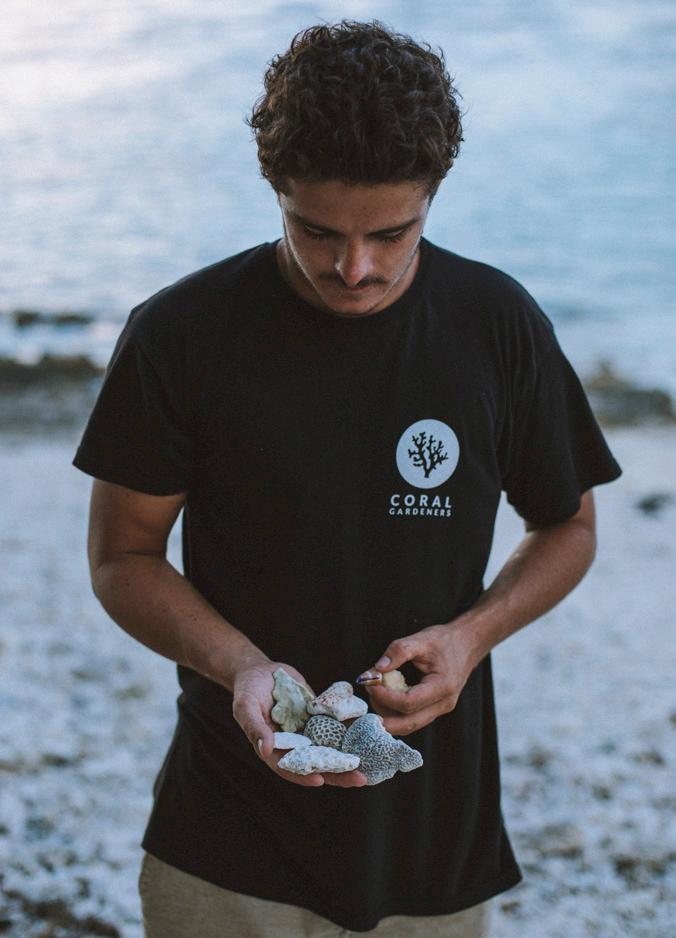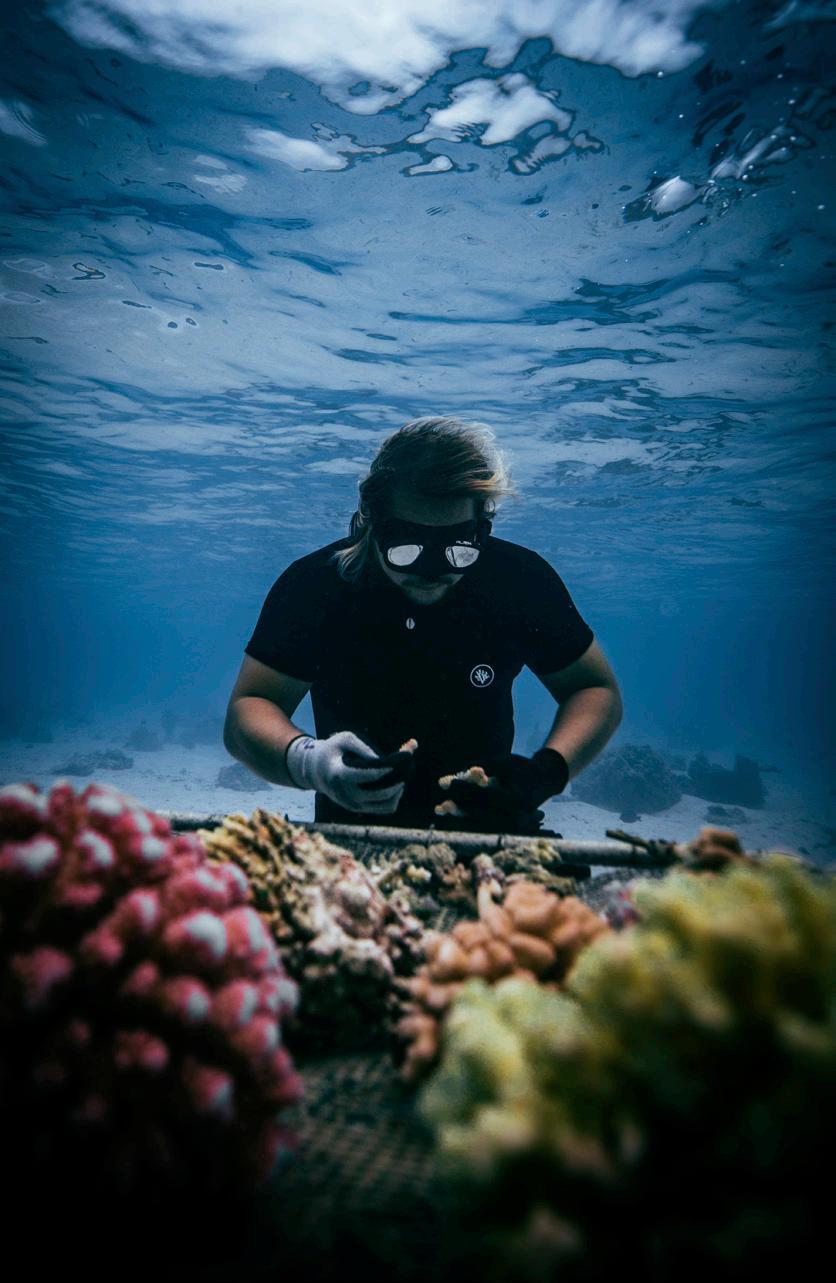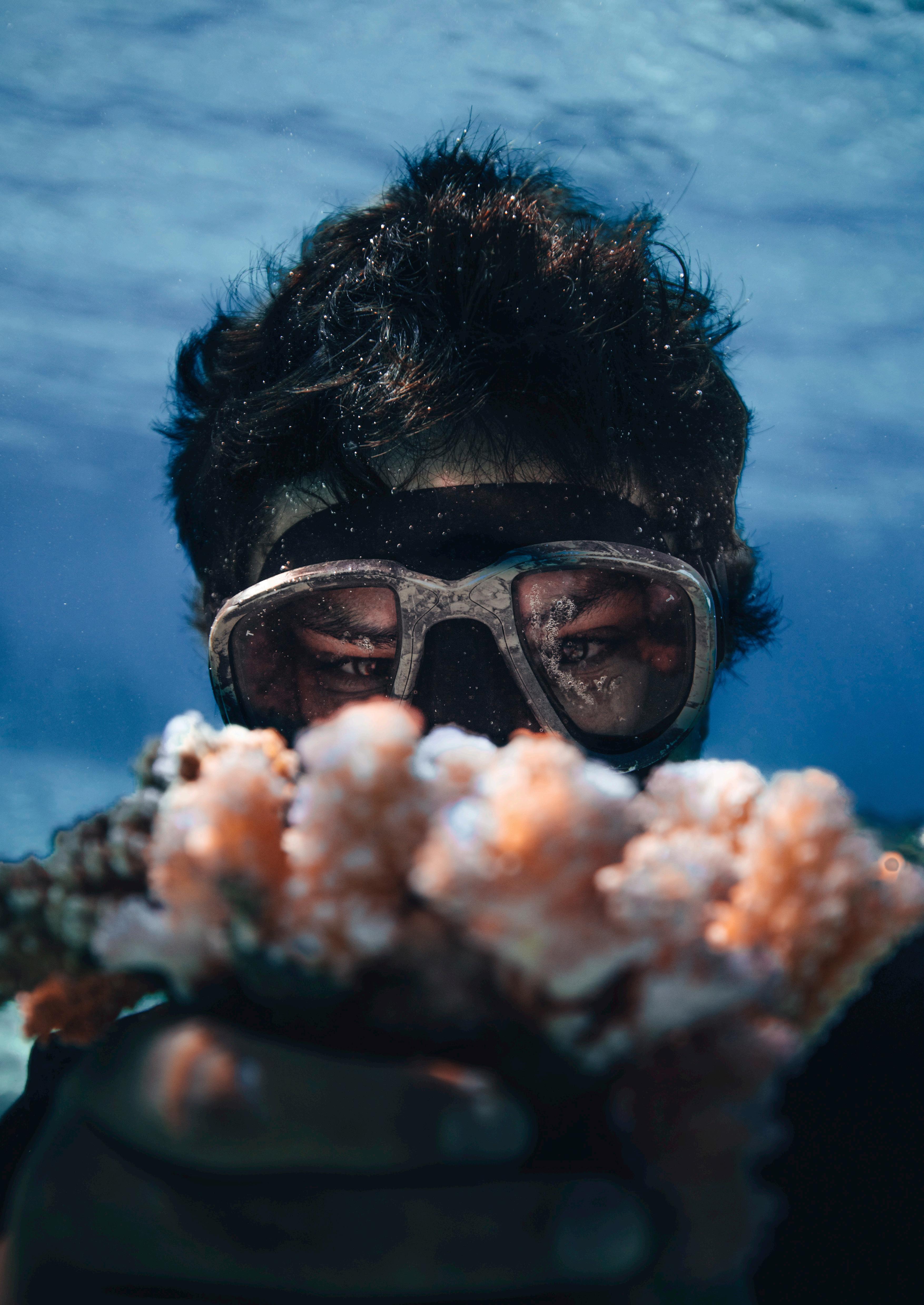
6 minute read
Coral Gardeners
FEATURE ALLY LANDES PHOTOGRAPHY KELSEY WILLIAMSON & RYAN BORNE

The island of Mo’orea.
Mo’orea is a South Pacific island and the pride and joy of French Polynesia. Considered Tahiti’s little sister, the island is said to be shaped like a heart when it is seen from above, making it one of the top destinations for romance in Tahiti – after Bora Bora. Known for its jagged volcanic mountains and sandy beaches, the coastal environment of Mo’orea offers ample opportunities for the study of coral reef ecosystems. Examples of every type of coral reef can be found in the 60 kms of coastline surrounding the island.
However, an alarming change is taking place. The reef is dying, and corals are going extinct.
Titouan Bernicot was born on the island where his parent’s worked as pearl farmers. Most of his childhood was spent in the water and with that, a deep relationship and virtue was bestowed onto him. The coral reefs have given him everything in life, from the waves he surfs to the food he eats.

Titouan Bernicot – Coral Gardeners Founder
His story begins in 2015 when he was out surfing with his friends and they made a most concerning discovery. The corals below their boards had turned bright white, and only a few days later, they had completely perished.
This led to a lot of heartache and not a lot of understanding. They took it upon themselves to start researching the phenomenon they had witnessed and they quickly realised that if coral reefs were to disappear, the entire balance of the oceans would completely collapse.
A lot of growing up and responsibility came to pass from that day on and they decided to act upon it. They became the Coral Gardeners!

Maoritai, a member of the restoration team checking to see if the coral fragments are ready to be replanted.
CORAL GARDENERS
This is a group of young and very motivated surfers and fishermen known as “the children of the ocean”, dedicated to making a change and protecting their ecological birthright. The project was born on the 28 th of April 2017, led by Titouan – the founder of Coral Gardeners – after they painfully watched the gradual degradation of the reefs of their beloved Moorea island over the years. They tipped off a crowdfunding campaign in 2017 with the support of former world swimming champion, Florent Manaudou (a Coral Gardener Ambassador) and achieved their funding objectives. They received press coverage in some of the top international publications such as Le Parisien, Elle magazine, Le Figaro and Paris Match, to name but a few.
Coral Gardeners is today made up of 15 team members at the HQ, including a few volunteers. They also have thousands of supporters including local students, tourists and people connecting from all around the world.
Their mission is to tell the story of reefs worldwide, and launch a global movement by raising awareness. They want everyone on the planet to know what a coral is, and how important it is to our oceans. They give conferences, school lectures, and run ecotours.
They harvest and plant corals back onto damaged reefs with much success! To date, more than 7,000 corals have been adopted and transplanted to the lagoon. Their vision is to fix one broken coral at a time. “Save the reef, save the ocean, save the world.”

Tehaps, a member of the restoration team monitoring the growth of the corals.
WHAT ARE CORALS?
Corals are unique and complex living structures known as marine invertebrates. They typically live in compact colonies of many identical individual polyps which are tiny, softbodied organisms which are related to sea anemones and jellyfish.Their base has a hard, calcareous protective skeleton called a calicle, which forms the structure of coral reefs. Reefs are given life when a polyp attaches itself to a rock on the sea floor and then divides itself into thousands of clones.
Polyps are translucent animals, but the reefs get their colours from the algae which the polyps host in their cells, called zooxanthellae. Both these organisms live in symbiosis – the corals provide protection and nutrients to the algae, and the algae provides the source of energy and oxygen.

Chelsea Kauai, one of Coral Gardeners ambassadors helping the team.
CORAL BLEACHING
Corals become stressed by temperature changes and pollution and in doing so, they will evict their symbiosis partnernership (the polyp and the algae) which causes the bleaching and can in turn, permanently kill the colony if the stress factor is not controlled.
WHY IS IT SO IMPORTANT TO SAVE THE CORAL REEF?
75% of the world's coral reefs suffer threats from pollution, overfishing, human activities or global warming. Coral reef coverage has already declined by 30-50% since the 1980s (M.Gaskill).
Without proper action put into place, all coral reefs are at risk of disappearing by 2050 with disastrous consequences for all marine life.
THE REEF RESTORATION SYSTEM
The first stage in the project is to seek out super corals and take clippings of no more than 10% from them. Then those clippings are taken to the nursery where they attach them to a rope transect for 12-18 months.
In the second stage, new clippings are taken from the nursery and cemented onto degraded areas of the reef to monitoring quadrants (1x1m). The corals grow, they then spawn and repopulate the reef with healthy, resilient corals.

Maoritai, checking which coral fragments are ready to be replanted.
THEIR TERRITORY
France is the only country in the world with coral reefs in all three oceans. Eight French communities are home to 10% of coral reefs in the world (Coral Guardian).
In French Polynesia, almost all of the 118 islands have coral coastal marine ecosystems, with the exception of the Marquesas Islands.
Although their islands are not located amongst the famous “coral triangle”, they have nearly 200 species of corals, 1,200 species of fish and 1,000 species of crustaceans. Coral reefs are, along with the world’s tropical forests, the richest and most productive ecosystems on the planet.
AMBASSADORS
They have a strong force of ambassadors represented by photographers Paul Nicklen, Cristina Mittermeier, and Tim Mckenna; freedivers Guillaume Néry and Kimi Werner, and marine influencer Madison Stewar t, to name a few.
By engaging the general public in their project, they call to all citizens to become reef ambassadors around the world through the various platforms of social media.

Titouan Bernicot inspecting a coral fragment.
CORAL REEF FACTS
• While covering less than 1% of our oceans, coral reefs host a 1/4 of known marine life (IUCN).
• Marine plants, including coral’s symbiotic algae, produce up to 70% of the oxygen we breathe (National Geographic).
• Corals are estimated to directly support over 500 million people worldwide. (IUCN).
• Coral reefs generate $36 billion in tourism each year (ZME Science).
• Coral reefs provide a protective barrier against storms and erosion (IPCC).
• Worldwide coral reefs cover an estimated 284,300 km 2 (UNEP).
• French Polynesian reefs cover about 15,000 km 2 , which makes up 5% of the world’s coral reefs.
ADOPT A CORAL: €25/$29
• Name it.
• They plant it for you.
• You will receive your adoption cer tificate with GPS coordinates, the name of your coral, and a photo ID.
www.coralgardeners.org










